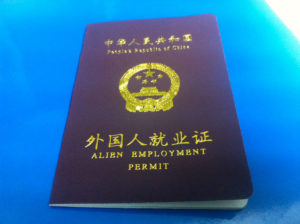On 1 November 2016, the People’s Republic State Administration of Foreign Experts Affairs 国家外国专家局 (SAFEA) introduced a new program for issuing work permits to foreigners. The program, which was rolled out nationwide in April 2017, combines the previous categories of ‘alien employment permit’ and ‘foreign expert certificate’ into one ‘foreigner work permit’ 外国人工作许可证, and streamlines the application process. It will also replace the current, mostly paper-based system with a digital registry linked to each worker’s ID. Most foreigners will be glad to see the end of the notoriously time-intensive application process; the new system requires half the paper work, even if both systems still require foreigners applying for certain categories of jobs to present an original copy of their university or college diploma. But the Chinese government will now decide how much it wants them based on a three-tier classification: A for ‘high-level talent’, B for professionals, and C for unskilled or service workers hired on a temporary or seasonal basis.
How will the government determine a foreigner’s place in the system? The exact metrics remain unclear. However, the point-based system will take into account salary, educational background, work experience, and age. The classification ‘A’ is given to talent such as scientists, tech leaders, and entrepreneurs, and accords a number of perks, including a visa ‘green channel’ 绿色通道 to speed up the application process. If an applicant graduated from a university in the world’s top 100, or has a bachelor’s degree and two years of work experience, he or she can expect at least a ‘B’. If the applicant has neither, they might find themselves stuck with a ‘C’ — which promises to make a longer term stay in China difficult. If the applicant speaks Chinese, however, they’ll earn additional points. If the foreigner will work in an impoverished, rural area or otherwise conform with government priorities, that could also help.
Foreign HR, a human resource company in Beijing, estimates that there are roughly two million foreigners in China. Government figures are much lower, and do not take into account foreigners working illegally.
On the one hand, foreign workers have been seen as a boon. The number of native English speakers working in English-language education is a source of pride for the Chinese schools and universities that employ them. State media regularly quote resident foreigners praising Party policies as a way of bolstering confidence in the policies among the general populace. On the other hand, grumbling about ill-behaved foreigners has become increasing vocal. (See the China Story Yearbook 2013: Civilising China, Information Window ‘Foreigners Behaving Badly’) In August 2016, a photo of a Caucasian man urinating on the Great Wall prompted Internet users to share other recent examples of poor conduct by foreigners.
With this new system, Chinese officials are suggesting that they can sort between the good and the bad. An article in the media about the new system said the government plans to ‘encourage the top, control the middle, and limit the bottom’ of foreigners.
Notes
Didi Kirsten Tatlow, ‘Hoping to work in China? If you’re a class C foreigner, it may be tough’, The New York Times, 21 September 2016, online at: http://www.nytimes.com/2016/09/22/world/asia/china-work-permit-visa.html
‘Do not speak of shame! Foreign girl removes pants then empties her bowels. This is China’s cultural relics! 不讲羞耻!外国妞脱了裤子就拉,这可是中国文物啊!’, Weidu, 17 November 2016, online at: http://www.weidu8.net/wx/1007147935281247
‘Pilot visa scheme for foreigners working in China 外国人来华工作将试点许可制度’, Xinhuanet, 19 September 2016, online at: http://news.xinhuanet.com/local/2016-09/19/c_129287913.htm




